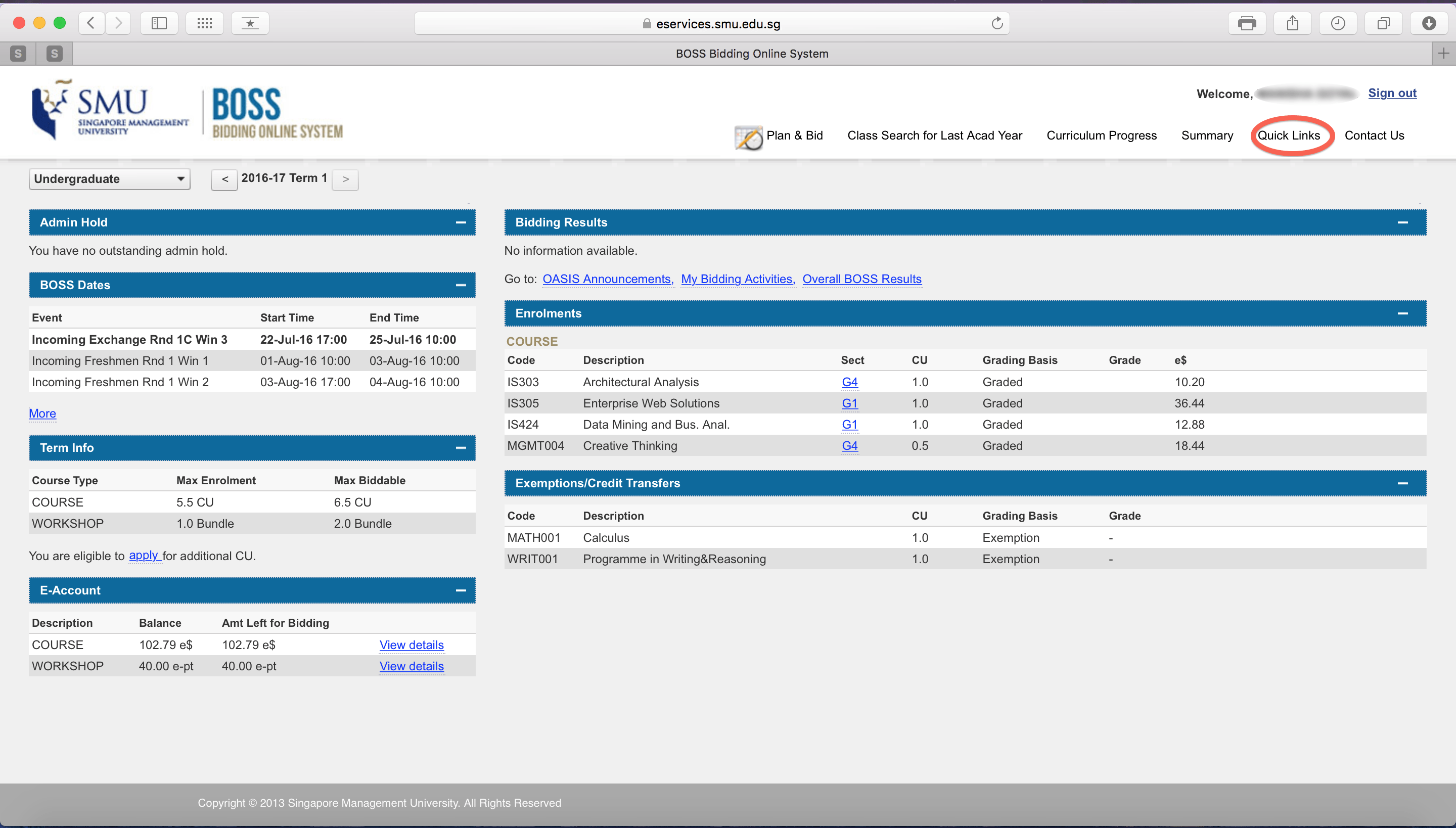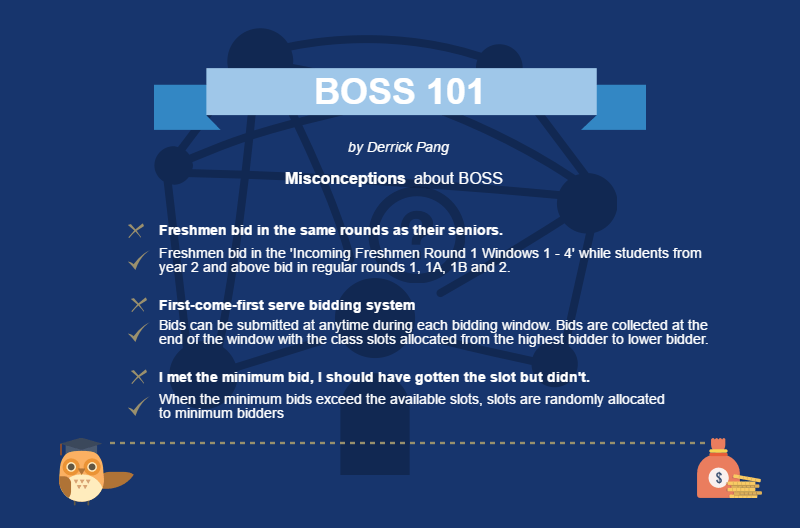
Hello, SMU Freshies!
You might be feeling as clueless as I was when I first stepped into SMU.
You will soon be (or perhaps have already been) introduced to a host of SMU life jargons: Internships, OCSPs (overseas community projects), overseas exchanges, OASIS… AND not forgetting the topic in question today—BOSS Bidding.
Module planning and BOSS Bidding is part and parcel of every SMU student’s life. At the start of the academic year, a few juniors approached me regarding module planning and BOSS bidding. BOSS Bidding has always been one of the perennial challenges faced by students as we frantically try to plan for manageable timetables and semesters, with a view to graduating on time. It is still a challenge for me today. However, don’t let this scare you. This short article will provide you with 4 key tips to surviving BOSS bidding.
First, let us break down what you can expect during the bidding period. Every student takes on between 4–5 modules each semester and freshmen are usually pre-assigned 1–4 modules each semester. Every semester, each student is given e$100 (electronic dollars/currency), on top of the balance carried over from the previous semester and other top-ups from doing surveys (so make sure you don’t miss them!). If you are a freshman, e$20 will be deducted for every module you are pre-assigned.
Tip #1 – Make full use of the BOSS system
The BOSS system is the go-to place for all your bidding activities before and during the bidding period.

This is the BOSS interface. See that red oval outline there? That is your one-stop-shop for all things bidding. The quick links take you to relevant pages regarding bidding. One of these links shows you the modules offered for the entire academic year, while another refers you to the important announcements regarding the upcoming semester (e.g.: make-up class dates for classes that fall on a public holiday). So do make sure you refer to these links before you start bidding!
One page I always refer to is the “Overall BOSS Results” page. This page shows all the bidding results from the previous semesters and I always consult it when deciding my bid prices. There are two points that I heed without fail:
- Always reference back to the exact same bidding round the year before. If you are currently at AY2016-2017Semester 1 Incoming Freshmen Bidding Round 1 Window 1, take a look at the AY2015-2016 Semester 1 Incoming Freshmen Bidding Round 1 Window 1. This will help provide you with a more accurate reference point.
- Always look at the median bid price. No one wants to risk being the minimum bid price holder. As such, it is not wise to decide on your bid price purely based on last year’s minimum bid price. Refer to the median bid price and choose your bid price around that range.
Tip #2 – Always remain calm
Keep calm and bid on. Before, during, and after bidding.

When bidding, calmly consider what modules to bid for, which professors to bid for, what time slot to bid for, and how much to bid. You would not want to end up in a situation where you spend too much on an under-subscribed module, or under spend for a popular module. Do the necessary homework (refer to Tip #1), and take the time to talk to your friends and find out which are the more popular modules.
After you receive your bidding results, you might get an unsatisfactory one. Remember that there are a few more bidding windows to go and you should have a backup plan, be it bidding for a different module or bidding for the same module of a different timeslot.
Tip #3 – Always have a back-up plan
Moving on to the next semester, you should have become more aware of the bidding Do’s and Don’ts. This time, always make sure you have a back-up plan. Bid for more modules than you set out to take in that particular semester. Have a backup plan for subsequent bidding windows, should you get unsatisfactory results in the first round.
Tip #4 – Always talk to your seniors

Your seniors would already have gone through bidding and module planning multiple times. Some of us are lucky to go through it without a hitch, while some of us have learnt our lessons the hard way. Regardless, your seniors—such as your camp facilitators and CCA seniors—are always willing to share their experiences and tips on bidding, such as pairing lighter modules with heavier ones. In short, approach your seniors for advice and I am sure you will get some really helpful tips for your own bidding experience!
Finally, I end off with three common BOSS misconceptions debunked by my fellow ASMU member, Derrick Pang.

P.S.: Here are important links you should remember to bookmark!
- Matriculation webpage: http://matriculation.smu.edu.sg/course-registration-boss
- BOSS Homepage: https://eservices.smu.edu.sg/BOSS/BOSSWeb/Default.aspx
- BOSS Overall Results: https://eservices.smu.edu.sg/BOSS/BOSSWeb/OverallResults.aspx


